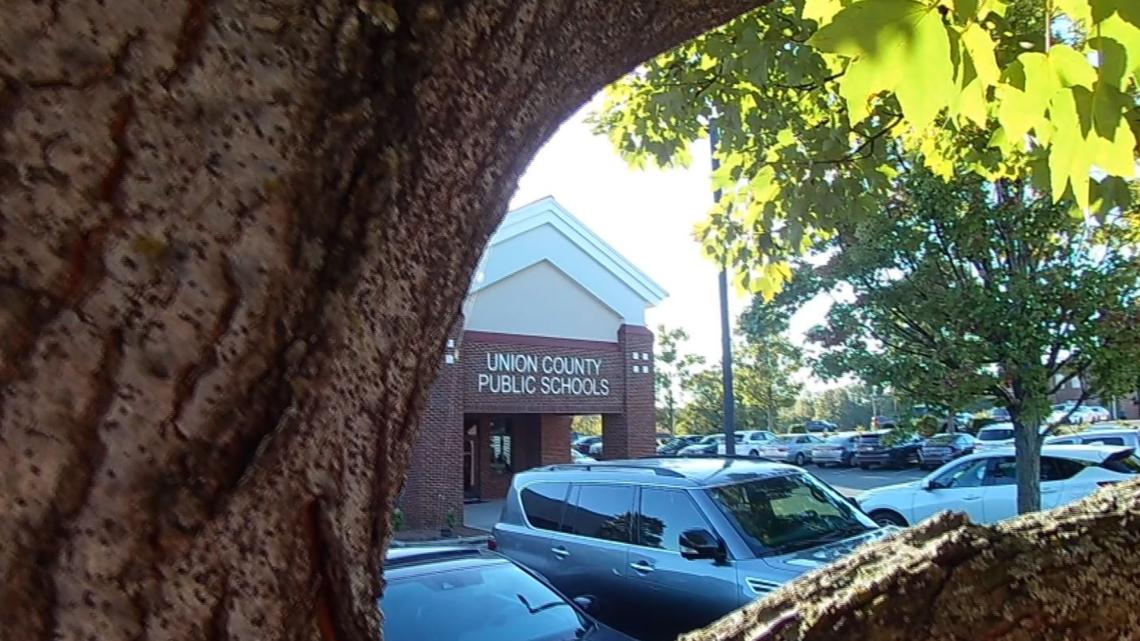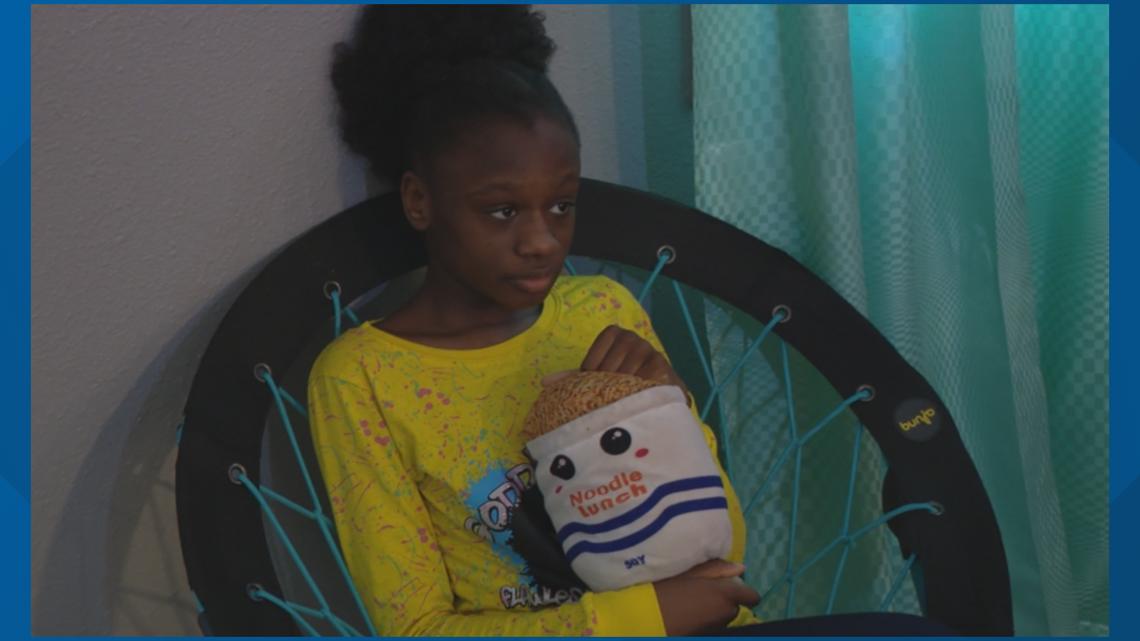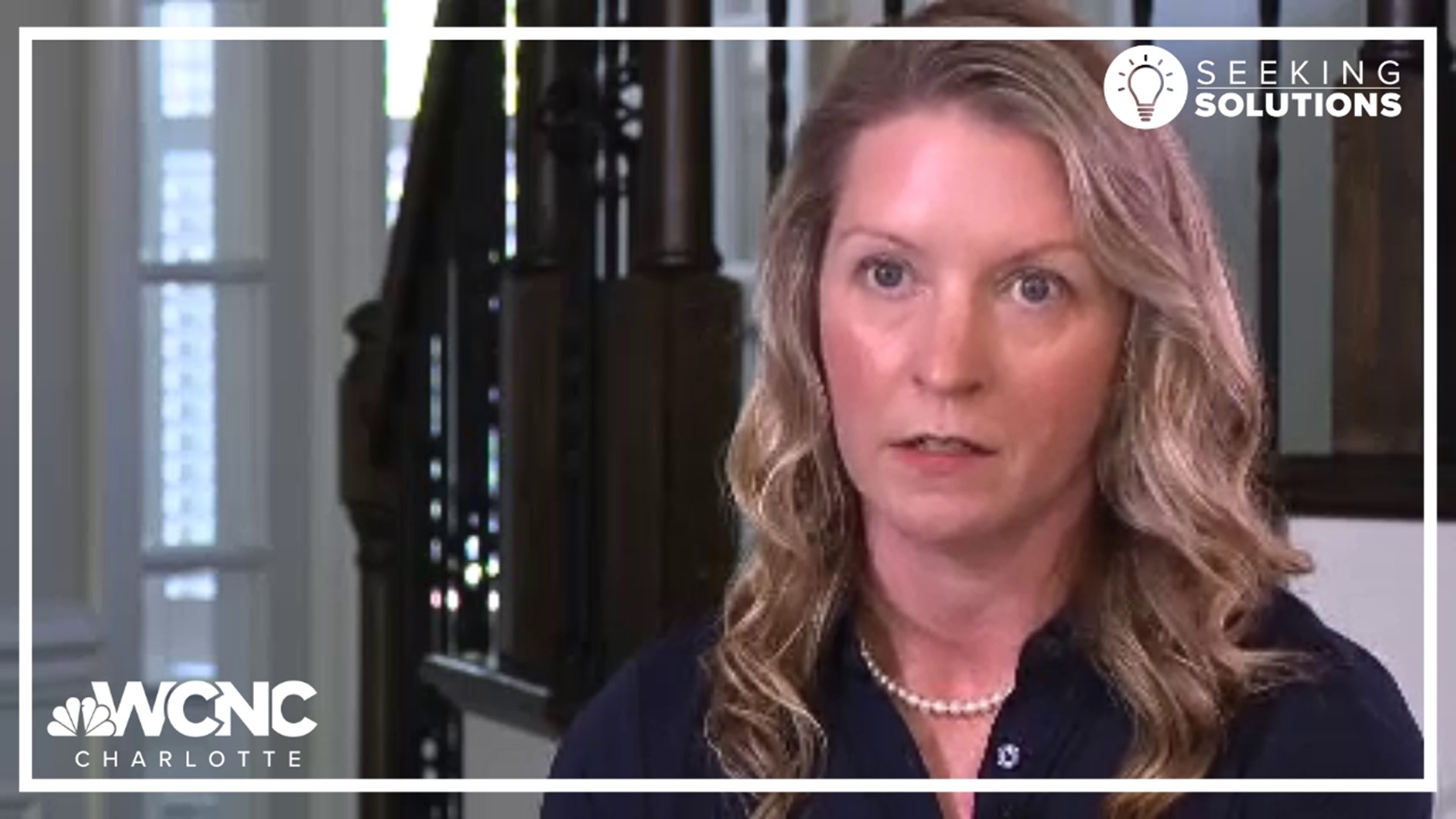WAXHAW, N.C. — The pandemic may have introduced most families to the frustration, isolation, and learning loss associated with remote learning, but students with disabilities and their parents have suffered the effects of that kind of education for years. Many still remain in that setting today.
Public records analyzed by WCNC Charlotte identified hundreds of vulnerable students in North Carolina who are not allowed to attend school, because of behaviors linked to their disabilities. Advocates believe the number of kids assigned to homebound learning is likely much higher.
Back to school?


As other kids excitedly went back-to-school shopping in August, 9-year-old Hannah Mesick started out this school year in the same place she finished the last: inside her Waxhaw home.
"This has been a huge burden on her," her mother Joyce Mesick told WCNC Charlotte in September. "She's really, really, really sad. She really wants to go to school."
Given just two hours of instruction a day at the start of the year, learning at home has remained a burden for her entire family, leaving her parents scrambling to juggle work, home life, and her schooling, all while fighting for Hannah's rights.
"It hurts. It really, really hurts. This child has pretty much had no education her entire third-grade year," Hannah's mom said. "There is no way a single parent could do this. I had to quit my job because I couldn't do both."
IF YOU HAVE A CHILD WITH A DISABILITY WHO EXPERIENCED EXTENDED SUSPENSIONS, SHARE YOUR EXPERIENCE HERE
Described as sweet, loving, and kind with "an amazing heart," Hannah's Pediatric Autoimmune Neuropsychiatric Disorders Associated with Streptococcal Infections (PANDAS) quickly shifts her mood and challenges her with anxiety. Her mother understands that disability can make school more difficult and dangerous for everyone. She's spent months advocating for an alternative.
"If I were a parent and I knew about a Hannah in the classroom, I'd be a little bit worried that Hannah could do something that could hurt my kid. I don't want her to hurt anybody else's kid. I don't want her to hurt any staff," Mesick said candidly. "My biggest worry is we are going to be stuck on homebound."


"Really, what you're aiming for is to not be in that homebound setting"
Ideally, kids with disabilities should learn alongside their peers, but advocates say some schools are so overwhelmed, understaffed, and ill-prepared to meet children's individual needs, they send kids home, often with support from the students' doctors.
Records show 643 children in North Carolina alone learned in a homebound (or hospital) setting in 2022, down from 804 in 2021, but attorney Ginny Fogg believes the real number is likely much higher.
"I think it's well over a thousand based on our cases, calls that we've received, and what we hear from parents," Fogg said. "Really, what you're aiming for is to not be in that homebound setting."
Up until recently, Fogg worked for Disability Rights North Carolina. The organization has repeatedly urged the North Carolina Department of Public Instruction to better track these students and provide more oversight, so they don't remain at home longer than they should, noting concerns about inappropriate homebound placements and shortened school days.


"They are aware of these issues, but have not chosen to take appropriate action to enforce the rights of students with disabilities who are put in these settings," Fogg said. "I suspect that there is frustration over how to serve students with challenging behaviors and I think there's a lack of willingness to engage in the behavioral supports that are needed."
NCDPI told WCNC Charlotte it "has worked collaboratively" with DRNC for the last seven years to address those concerns.
"In 2021, NCDPI was responsive to concerns, implemented additional strategies, and ensured technical assistance was provided to its stakeholders consistent with its requirements under IDEA," Deputy Communications Director Jeanie McDowell said in an email. " As recently as January 2023, staff from NCDPI and DRNC met to discuss the results of these efforts."


Despite those words, DRNC maintains the state has not yet taken "appropriate and necessary action to ensure statewide accountability."
"DRNC's concerns stem from representation of hundreds of students with disabilities, spread across many school districts, placed on long-term homebound or shortened school schedules by school districts, often for multiple, consecutive school years, with little or no instruction provided by the school district," the non-profit legal advocacy agency said in a statement. "In most cases, students received less than five hours of instruction per week. In every case, the student was placed on homebound or a shortened school day for behaviors related to their disabilities. School districts' use of such placements for this reason and without appropriate, evidence-based supports and services and evaluation of less restrictive placements, violates state and federal education and discrimination laws – and needlessly harms disabled students, preventing them from learning and thriving like their non-disabled peers. While we appreciate DPI's collaborative interactions, DRNC continues to see the same fact pattern year after year – students with disabilities put on long-term homebound and shortened school day placements because of their disabilities with no meaningful oversight of their progress or a plan to return them to school. DPI has the obligation and expertise to monitor and prevent such placements but has not yet taken appropriate and necessary action to ensure statewide accountability so that disabled students get the education they deserve, and that the law requires."
In addition to "homebound" students, records identified at least 21,322 others that districts have reported who spent less than 40% of the day in class on a modified schedule in 2022.
WCNC Charlotte's "Suspended" series previously found schools in North Carolina report suspending and expelling students with disabilities, per capita, more than any other state in the country.
"What we really see when we see these numbers is a failing of the systems, not of the individual youth," Legal Aid of North Carolina Right to Education Project Managing Attorney Jen Story said. "We have to work to keep students in schools."


State records reveal most of the students punished at length are Black. Sharlene Smith's daughter Sydney is living that reality.
Records show the Gaston County 12-year-old, diagnosed with autism and ADHD, faced 14 days of out-of-school suspension last school year. A required review concluded Sydney's disability caused her aggressive behavior.
Gaston County Schools, with support from Sydney's doctor, eventually sent her home for the rest of the year. Smith said Sydney has remained homebound ever since with "inconsistent services."
"It's devastating. It's traumatizing. It's embarrassing. It's deflating," her mother said. "It's a very demeaning feeling."
The district declined to go into detail about Sydney's case, citing student privacy, but in a statement said Gaston County Schools takes the mother's concerns "seriously" and has worked with her and continues to do so, "because we also want what is best for her daughter."
Due process complaint
Joyce Mesick said her school district hasn't done enough over multiple school years to come up with a solution that addresses Hannah's needs.
"School has been a big, big struggle for Hannah," Mesick said. "From January 2022 until June 2022 she was probably sent home at least over 40 times."


Earlier in 2023, she filed a due process complaint accusing Union County Public Schools of, among other things, failing to provide Hannah with a free appropriate public education. The case has dragged on for months.
"This whole process is really, really, really daunting," Mesick told WCNC Charlotte. "I am not optimistic that we will get justice for Hannah through this due process hearing, unfortunately."
A judge wouldn't let WCNC Charlotte's cameras inside the most recent hearing in October. Over several days, Mesick argued why she believes a nearby specialty school for kids with profound disabilities is best suited to meet Hannah's needs; really, the only solution in her eyes.
The district disagreed, saying Hannah would be better served in a quiet room at an elementary school where the school system can offer two hours of instruction a day with a pair of homebound teachers. The district considers that the best alternative after removing those teachers from her home in September when the girl grabbed a kitchen knife and threatened them.
"We continue to believe that her return to school, with the program and services offered, would provide Hannah with the appropriate supports and instruction to assist her with accessing her educational day and to have access to her peers, including non-disabled peers," the district's assistant exceptional children director wrote in a September 15 letter.
UCPS's attorney argued the district has remained responsive, professional, sympathetic, and empathetic to the child and her family's needs.
"Every time I've attempted to bring her to a school building it's been a disaster," Mesick said. "Why would I put her in that same situation?"


Mesick has since filed a separate federal lawsuit, among other things, asking for an investigation and/or audit of UCPS's special education department, accusing the state and district boards of education (and others) of "negligence, retaliation and discrimination."
On October 31, Administrative Law Judge David F. Sutton ordered the district to make a referral to Mesick's desired specialty school, Melmark Carolinas, and a separate day treatment program within UCPS as well to see if either placement "would be appropriate."
If Hannah is placed at Melmark through this process, her case would be groundbreaking. It would be the first of its kind in North Carolina in which a judge ordered a Melmark placement, establishing case law that would help future families facing similar challenges.


In the meantime, another day, week, and month has passed without any resolution for Hannah. Instead, adults are still trying to figure out what is best for the child.
"Due to pending litigation, Union County Public Schools is not at liberty to share details about this case," UCPS Assistant Superintendent of Communications and Community Relations Tahira Stalberte said in an email. "It is UCPS practice to have staff meet with parents who have concerns about their child's education and offer support appropriate to meet the individual needs."
Hannah is constitutionally guaranteed an education, but the 4th grader with a disability is currently without one.
“This has been a really, really, really, really tough, tough year for her and it breaks my heart as a mom, because I really, really, really want her to get an education,” Mesick said.
Contact Nate Morabito at nmorabito@wcnc.com and follow him on Facebook, X and Instagram.
WCNC Charlotte is committed to reporting on the issues facing the communities we serve. We tell the stories of people working to solve persistent social problems. We examine how problems can be solved or addressed to improve the quality of life and make a positive difference. WCNC Charlotte is seeking solutions for you. Send your tips or questions to newstips@wcnc.com.

